First, it was General Sani Abacha whom he deputised, next was General Victor Malu who headed the tribunal that sentenced him to death but Donaldson Oladipupo Diya outlived the men who thought they had the power to determine whether he could live or not.
The story of Diya, who drew his last breath on Sunday, is incomplete without his days under Abacha. He served as second in command under that regime that sealed his fate and condemned him to death but while Abacha died around the time Diya and those charged along with him were being taken for execution, Malu passed on in October 2017.
Diya was arrested for plotting to topple the regime of Abacha but the General insisted it was a setup.
- PROFILE: Gusau, one of the forces that crushed Matawalle
- OBITUARY: Alaafin, the boxer who lost palace touch because of Fela’s mother
“All the soldiers guarding us, including Adisa and Olanrewaju (who were charged along with him), were from Abacha. So, how do you plan a coup when the soldiers guarding you are from the Head of State? It is not done. That was enough to show that it was a phantom coup. And, in any case, which other coup have we seen that people would be recording even before the coup was executed? It was obvious that all those that were planning the coup were there in government, not those that were suspected,” Diya had said in an interview.
CLOSE SHAVE WITH DEATH

Weeks before his arrest, Diya survived different attacks, including a bomb attack at the airport.
He was on his way to the burial of the mother of Major-General Lawrence Onoja, his principal staff officer, when a bomb went off as he made to enter the aircraft to take him to Makurdi, Benue State. One of the security men was blown to pieces, while another who was with the dead man suffered first degree burns and later died at a hospital.
Sensing that there was a plot to take him out, Diya took the matter directly to the then head of state, who reportedly said, “Dipo, forget it, it’s only an accident. Let’s thank Allah.”
A week after that incident, Diya was arrested at a guest house where he took cover after fleeing Aso Rock when he sensed the danger ahead.
TROUBLE TOWARDS THE END
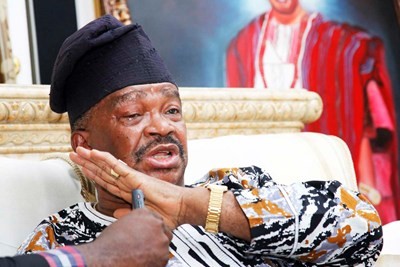
The interesting thing about Diya’s career is that the most dramatic part was towards the end. A civil war veteran, he was one of those groomed by Major Benjamin Adekunle, alias Black Scorpion. Adekunle was in charge of Third Marine Commando that actively fought the war against Biafrans. He was in charge of the team until he was replaced with Colonel Olusegun Obasanjo, who eventually ended the war.
So, Diya escaped all the hurdles until the twilight of his career. The June 12 annulment crisis was raging when Abacha seized power. At the onset, he had promised to hand over to a civilian government, but after years in power, the stage was set for Abacha to transmute into a civilian leader. His regime created five parties which all endorsed him as sole candidate for his presidential conquest, a situation the late Bola Ige described as five fingers of a leprous hand.
ASSIGNMENT FROM ABACHA
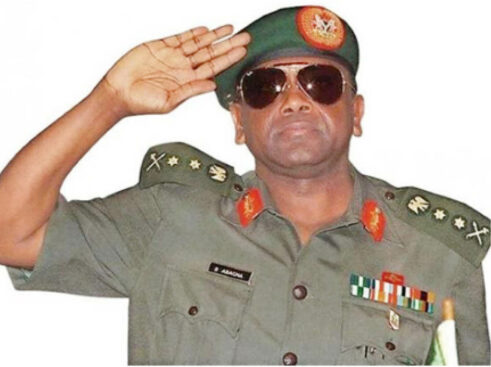
To know what his lieutenants thought of his idea, Abacha sampled their opinions one after the other, but Diya told him he was against it. According to Diya, Abacha told him to find out from other Service Chiefs if they were in support of the idea.
“We had a one-on-one discussion, where he (Abacha) asked for my view: ‘Do you think we should continue?’ That was his question? The correct answer was ‘no, don’t let us continue.’ Then he said why don’t I discuss it with the other Service Chiefs? Let’s have their opinion. That was the first feeling I had that he probably wanted to continue.
“And I called these Service Chiefs and met with them. And I now went back and told him that, ‘No, none of them told me that we should continue.’ But maybe what they were telling me was different from what they were telling him. I don’t know and I leave that to God.”
According to Bayo Onanuga and Sunday Dare, journalists of The News, who met Diya at Postiskum prison in Yobe State, on Saturday, 20 December 1997, General Ishaya Bamaiyi, the Chief of Army Staff, and his retinue of GOCs went on schedule to Diya’s house, where they all took the final avowal to go before Abacha.
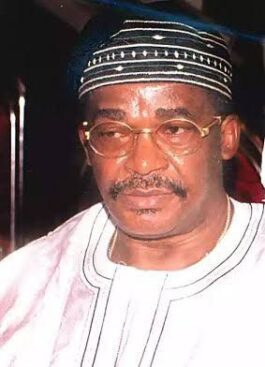
Onanuga, who is currently spokesman of President-elect Bola Tinubu, and Dare, Minister of Sports, said Diya was not supposed to go with Bamaiyi and others. They said the strategy was that he should operate as an outside person and when Abacha brought the demand ultimatum to his notice, he (Diya) would throw his weight behind them and Abacha, finding he had lost all support, would agree to leave.
“A few hours after they left, Diya got intelligence that armed soldiers were on their way to his house and he concluded that Bamaiyi and company had failed. Sensing the seriousness of the situation, Diya’s security detail, a Deputy Superintendent of Police, took him to a hiding place,” read The News report.
But on December 21, 1997, Diya was arrested alongside Major General Tajudeen Olanrewaju, and Major General Abdulkareem Adisa, who was then Minister for Works and Housing but had earlier served as Military Governor of Oyo State.

Professor Femi Odekunle, Political Adviser to Diya, was also arrested. The memo he wrote to Diya captioned “Confidential Memo Not For Filing”, had leaked. From the account of Lt. Col. Muyiwa Badewole who was assigned to defend Odekunle at the Tribunal, the Professor, in the memo counseled General Diya to “test the limits of his power” as the Number two man instead of constantly grumbling and complaining of being sidelined by Abacha. Odekunle, who goes into record as Nigeria’s first professor of Criminology, died of COVID in 2020.
ASO ROCK DRAMA
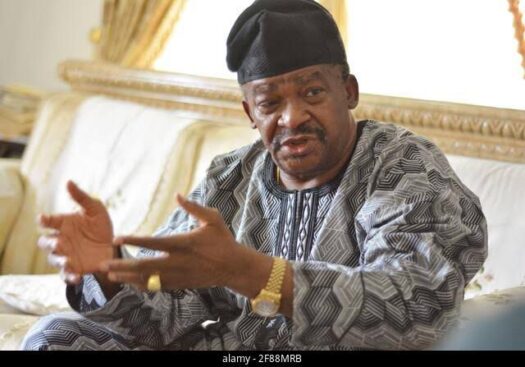
There was drama in Aso Rock, where Diya was taken. He was said to have been first put in a room where he found Bamaiyi and others, already in handcuffs. According to one of the coup convicts, Diya at this point, assumed leadership of the conspirators, being the most senior officer involved. Thus, when he was taken before Abacha, he reportedly owned up to the plot, volunteering to take the blame for everybody involved. He never knew at the time, that the ‘capture’ of Bamaiyi and the GOCs was all a game. He also did not know that the session with Abacha was secretly recorded.
When he later appeared before the Human Rights Violation Investigation of Nigeria, which was set up to investigate abuse during the period of military rule from 1984 to 1999, Diya denied kneeling to beg Abacha. Apparently unaware where the conversation was headed, Diya, who wore a golden neck chain and flashy rings on his fingers, told the lawyer grilling him that “Dead men don’t rise”.
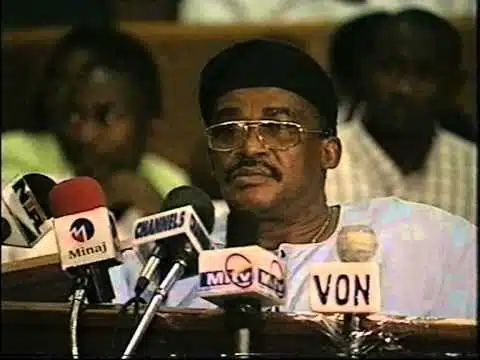
He said this in response to the question if he could recognise Abacha if the former Head of State appeared before him.
“Did you weep before Abacha who gave you tissue paper to wipe your tears?” the lawyer asked to which Diya responded, “That’s your machination!”
Embarrassment was written all over him when a video of him kneeling before Abacha was played before the commission better known as Oputa Panel.
‘BEGGING ABACHA: MY STORY’
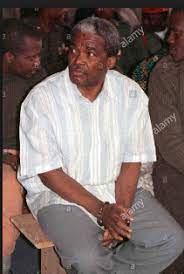
But Diya had a response when journalists caught up with him years later.
“It made me imagine the level of the inquisitiveness of our press men. How could you be playing a tape that had no voice? Not a single word came out of that tape. So, you could see that the tape was the imagination of somebody just to flag off an idea, amplify it and blow it out of proportion, as if it truly existed. It is true I had a discussion with General Abacha, when these officers were arrested. And these officers while going to the State House passed through my house, because there is no way you will go to the State House without passing through the house of the Chief of General Staff.
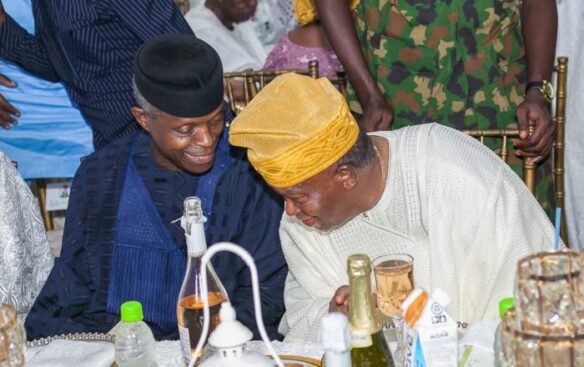
“And all we were discussing then was that the military should leave. And we were talking of leaving in October and these officers said they were going to tell Abacha. And they were all in mufti. So when I learnt that they had been arrested, I was stunned. I went to Abacha and said ‘These officers came to me and said they were coming to discuss such and such matter with you.’ And I said ‘Please release them. I am responsible.’ How that tape now came out now and turned out that I was begging Abacha. Up till now, nobody can say that they heard a single word from that tape.”
COVER BLOWN
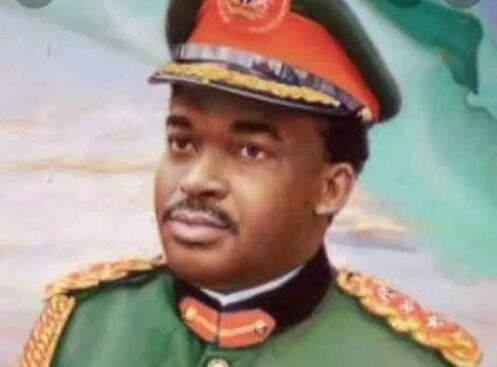
Diya went further to narrate how he felt when he realized that those who were supposed to be the primary target of the coup had been set free.
“Now, what I was afraid of was what actually happened on the day of the trial, because I only saw General Olarewaju and General Adisa. I was stunned.
“And that was when I now asked, ‘Where is Bamaiyi? Where is Aziza? Where is Muda?’ I can’t remember now. The other Mudashiru was a GOC of 2 Division, because the impression given to me was that they were all arrested. And when I now got to the court and only saw Olanrewaju and Adisa; that was when I now knew that this is truly a conspiracy and it was organised from the top. And I, Oladipo Diya was the target. That was what broke the camels’ back; and the news went all over the world. So naturally, I was stunned. I was expecting that if you think that we have said something, or that we were planning something, then you put us on trial and let us all defend ourselves… So the phantomness of the coup just came out glaringly for everybody to see. So, we thank God.”
BAMAIYI: DIYA WANTED TO USE ME AGAINST ABACHA
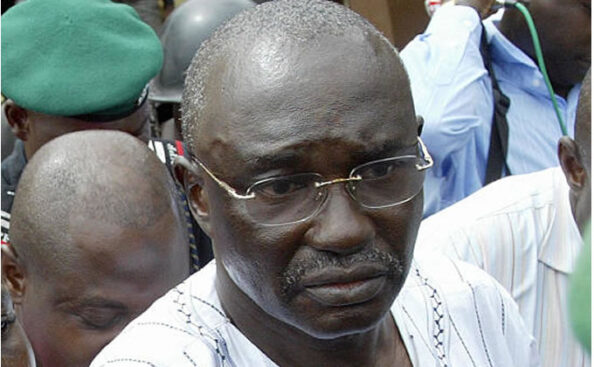
But Bamaiyi insisted that Diya knew about the coup and wanted to use him to execute it.
In his book, ‘Vindication of A General’, released in 2017, Bamaiyi said Diya started planning the coup as early as 1994. He said Diya complained that Abacha “was not doing well.”
According to him, the then second-in-command also said Abacha did not come to work early and was not listening to him and other senior people in government.
“On one of such visits, at his Ikeja residence, he mentioned how Gen. Abacha had not been doing well. He made the statement during the next visit and I asked what the problem was,” Bamaiyi, who was at the time in charge of Lagos garrison command, wrote.
“Diya mentioned that the commander-in-chief did not come to the office early and was not listening to him and other senior people in government. I told him I believed Gen. Abacha would listen to him because of their special relationship, I knew how many times Gen. Abacha had stopped plans to retire him.
“On the next visit, Diya said openly that there was a need to remove Gen. Abacha and that he was being blamed for the failure of the government from various quarters.”
He said when he asked Diya to tell him where the complaints were coming from, the second-in-command did not mention “specifics.”
“Gen. Diya went on to tell me I was one of the officers he trusted, and he would rely on me to get Gen. Abacha out of office so the country would move forward under his leadership. I told him I would think it over and get back to him. I informed Gen. Abacha, who said he was going to put Diya on trial.”
He said he suggested to Abacha that there was need for patience since there was no evidence and he could not be acting alone. Bamaiyi added that he learnt that some service chiefs were retired because of an alleged plan to remove Abacha.
TRIAL BEGINS
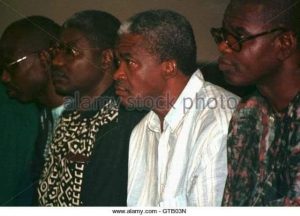
On January 3, 1998, the Chief of Defence Staff, Major General Abdusalmi Abubakar set up a Special Investigation Panel, SIP, made up of 12 Senior Military Officers to investigate the alleged coup plot. The Panel was headed by Major General Chris Abutu Garuba. The Panel recommended the setting up of a Special Military Tribunal to try the arrested officers.
On February 10, the then Chief of Defence Administration, Rear Admiral Festus Bikepere Igbeyinadun Porbeni CFR, also of Course 3 of the NDA announced the setting up of a Special Military Tribunal, SMT, to try the detained Military Officers and some civilians.
The seven-man panel was headed by Major General Samuel Victor Leonard Malu, also of Course 3 of the NDA. Admiral Porbeni gave General Malu’s Tribunal one month to complete its sitting.
On February 14, the Tribunal held its first sitting in Jos, Plateau State. During the arraignment, General Diya asked the Tribunal ‘where is the Chief of Army Staff, General Bamaiyi, the mastermind, the planner and the executioner of the coup’? The first Prosecution Witness was Brigadier General Patrick Aziza. The trial was held in camera at the Rayfield GRA, Jos, Plateau State. The proceedings were filmed on a daily basis and sent to Abacha for his personal viewing.
Before sentencing the officers, Malu reportedly held a private meeting with Abacha at the Villa in Abuja and intimated him of those guilty and those not guilty. Abacha was said to have been shocked that Professor Odekunle was not found guilty.
On Tuesday April 28 1998, Gen. Malu’s Tribunal sentenced Gen. Diya and others to death.
Abacha fixed a meeting for June 8 to review the recommendation of the panel, but before the meeting held, Diya and his co convicts had been moved to Kano where they were to be killed.
Diya spoke on this encounter, “If you were in an enclosure with people like Sergeant Rogers who were very hostile, you would naturally have thoughts because when you see Rogers, you have indirectly seen death. You don’t see Rogers and smile the following day. We were brought to Kano from Jos for execution. At the end of the day, Abubakar came and there was no execution anymore. So, that was a narrow escape but we give that credit to one Sgt. Bush who became friendly out of the eight soldiers that came with Rogers for the alleged execution.
“He was one of Rogers’ men who took us, including Olanrewaju and Adisa from Jos to Kano. When we got to Kano, they hid us inside a jeep, took us to a bungalow and as usual, the rumour started that we were to be executed the following day in Kano. That night, Sgt. Bush went to buy battery for his radio. So, while he was out, he heard on BBC that Abacha had died, so that was when he made up his mind that he was not going to be party to the execution since Abacha had died. When he told Rogers that he was not going to be a part of the execution, he insisted we should be killed. Rogers said they had already been given an instruction which they had to follow. So, the camp was divided into two. Bush and three other men supported him and Rogers and the other men were on the other side too. That was how the camp split into two and nothing happened the following day. By the following morning, Abdulsalami Abubakar had resumed duty as the head of state.”
ABACHA NEVER PICKED CALLS
Diya also narrated another encounter when he and others were almost killed but were save because Abacha didn’t take his calls.
“We were to be executed in Jos, Plateau State. They had taken us out of prison and Sergeant Barnabas Rogers was in charge, decked in battle dress. They were to take us for execution. They took us out. Adisa was there, so was Olanrewaju. As we were going, around midnight, the vehicle stopped. The reason the vehicle stopped, we didn’t know, but it stopped. Was it the engine? Was it tyre? We didn’t know. We were there, waiting and waiting. When it was 5:45a.m. in the morning, the driver started the van, made a U-turn and took us back to prison.”
“Again, what happened? It was miracle of God. It was divine intervention because, you know, one Major was complaining to the GOC. I remember that the GOC was one of our students, now a commandant of the National War College. The Major was challenging the GOC: ‘You are taking these people for execution in the morning.
“The execution was to take place at 7.00 a.m. All you were saying was that somebody phoned you on behalf of Abacha. Suppose tomorrow, the person denies, what will you have as evidence?’ The GOC was stunned. We heard the story later after they had returned us to the prison. Then, the GOC now said okay and he started trying to call Abacha, just for Abacha to give a go-ahead.
“This officer could not do anything without Abacha’s instruction. But Abacha had an attitude: he never picked phone calls. And that attitude of not taking phone calls was another miracle. He did not pick his calls and when the officer tried and tried until around 5:30 a.m. and could not get Abacha, he had to give instruction that they should return us, saying that he would go to Abacha to take permission from him.”
While Abdulsalami Abubakar released him from prison, it was former President Goodluck Jonathan that granted Diya a state pardon.
ROGERS BEGGED FOR FROGIVENESS

Asked if he forgave those who tortured him in prison, Diya said, “Look, asking anybody about anything is about conscience. Those that we are in position to see, we have talked and some have even apologised to me. Somebody like Rogers, during the Oputa Panel, he prostrated and said he was sorry. I told him; ‘that sorry, when he gets back home, kneel between you and your God and say what you have told me now and ask God to forgive you. I sympathise with you, I pity you; you are just a Sergeant. What is a Sergeant; a Sergeant in a platoon means nothing.’ So, Rogers I saw and he apologised and that was all. But all the others are far and in fact some of them we don’t even know this condition now. Somebody was telling me that one of the former Chief of Army Staff, not Bamaiyi, that he is completely paralysed. He was the one who was the judge of the court. He was the one that wore Abacha’s badge during the trial. When you are still in service and you are made a judge! That day we all lost hope that this man had changed and really we were right. And the other day he boasted that if I tried Diya, I will jail him again. But where is he now? So, many of them are in positions that you will pity them when you see them.”
While someone like Obasanjo, who also regained freedom following Abacha’s death went into mainstream politics, Diya withdrew from public life, devoting most part of his time to Methodist Church Nigeria, Abule Ijesa, Lagos, founded by his father.
He kept on thanking God for sparing his life and not making him end in the dungeon.
In one of his final interviews, Diya said, “I thank God for reaching the peak of my profession which was when I became the Chief of Defence Staff. That was the highest anybody could reach in the Armed Forces, be it Army, Air force or Navy. The post of the Chief of General Staff was a political office. So naturally, I was happy and suffice to say that it formed part of my achievements in life. If a lifespan was 100 years and people were given 2 years each to be second in command, only 50 persons would get there in a lifetime. I thank God.”
THE MAN DIYA
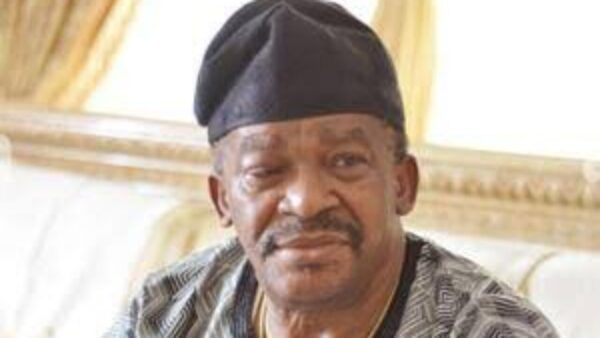
Born in Odogbolu, Ogun State, on April 3, 1944, Diya attended Yaba Methodist School from where he procceeded to Odogbolu Grammar School in 1957. Just like Odogbolu Grammar School, he was also among the pioneer students of the Nigeria Defence Academy (NDA) that graduated as Regular Course One cadets on March 18, 1967. One of his peers at the NDA is retired Gen. Aliyu Gusau.
Before his appointment as Abacha’s deputy, Diya was the pioneer Commandant of the Nigeria War College between 1991 and 1993. Earlier than these, deceased Gen. Diya was Commander 31, Airborne Brigade of the Nigerian Army.
He was appointed Military Governor of Ogun from January 1984 to August 1985, the period during which he banned night parties and closure of roads by revellers in a state widely known for “owambe’’ all-night parties. He became General Officer Commanding 82 Division, Nigeria Army in 1985.
While in the army, he enrolled to study law at the University of Nigeria, Nsukka, but later moved the programme to Ahmadu Bello Univeristy, Zaria. He later went to law school and was called to bar on the same day with his first son, Prince Oyesinmilola.
Diya was survived by Josephine, his wife, many children and grandchildren. A former member of the House of Representatives, Mr Wole Diya is his younger brother; Barr. Kehinde Diya is also his younger brother.
Olusola Diya who was recently promoted to the rank of Brigadier-General in the Nigerian Army is also his brother.
Diya authored a book entitled: “Destiny Anchored on Faith’’ which encompassed the life he lived and elucidated on the role he played during Nigeria’s civil war.
VANITY UPON VANITY
As a man of high calibre who spent the greatest part of his light in public, Diya attracted the best to himself. Many wanted to be in his good book. However, a journalist who encountered the General a few years to his death narrated the encounter below:
It was Gen. Oladipo Diya’s birthday at his Ikeja GRA residence. There were only a handful of folks in the house. The atmosphere was sober and somehow quiet. The adjoining Streets around his house were deserted. Gen Diya sat on a chair in the corner of the sitting room with his gaze fixed on the adjacent wall in sobriety. His mien was difficult to decipher. He shook the hands of the few well-wishers, smiled and responded to their felicitations.
The inquisitive young journalist sneaked up to the General.
“Good evening Sir. My name is Rasheed. I am a journalist. I have covered your birthdays for our Newspaper for the last few years. Today, my Editor did not send me. I came on my own” the young man introduced himself.
The General’s face lit up with smile. He stood up, shook the hands of the young man and genuinely welcomed him.
“Those years that I covered your birthdays, it was not easy to get close to you, not to talk of interviewing you. To take a photo of you was extremely challenging. Journalists swarmed the whole place like bees. All the Streets around your house would be filled with cars, and inside the house would be jam packed with people who came to rejoice with you on your birthday. But today, there are only few cars on your Street and less than 15 people in your house. Yet today is your birthday. What do you have to say?” the journalist asked.
Gen. Oladipo Diya wiped the smile from his face and looked intently at the young man. He put an arm on the journalist’s shoulder and solemnly said: “Well my young friend. I called you “friend” because you are my friend for you to be here today. You see those hundreds of people who thronged my house on my birthday and blocked my Street with their cars when I was the Chief of General Staff? Those were the friends of the Chief of General Staff. The very few people you are seeing here today are the friends of Oladipo Diya. Oladipo Diya and the Chief of General Staff used to be the same person then. Today, they are two different people. Most people associate with us because of our position and what they can get from us. Don’t ever forget that.”
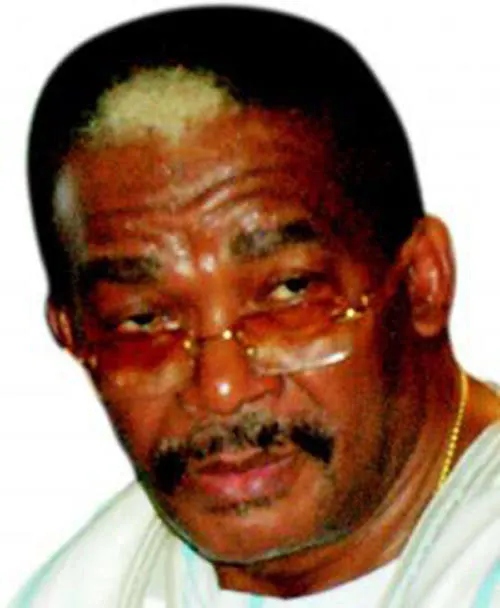
 Join Daily Trust WhatsApp Community For Quick Access To News and Happenings Around You.
Join Daily Trust WhatsApp Community For Quick Access To News and Happenings Around You.


